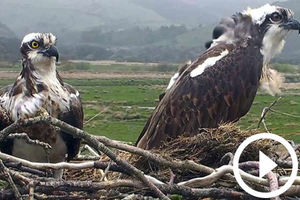Two osprey invaders usurp nest during rare pair's migration trip
A pair of rare ospreys had a shock when they returned from a 3,000 mile migration – to find two rival birds had moved into their nest.

Monty and Glesni, regular stars on BBC's Springwatch, returned to their nest in Wales after spending the winter in Africa to discover it had been taken over by squatters – two other ospreys.
Last year the pair raised two chicks at the nesting site near Machynlleth, which is looked after by the Dyfi Osprey Project.
The invading birds, Blue 24 and Dai Dot, who usually spend their summers in Rutland, 180 miles away, paired up in the nest on April 3, leading staff at the project to speculate that Monty's dynasty could be coming to an end. But five days later Monty put paid to that idea when he returned.
Emyr Evans, of the Dyfi Osprey Project, said: "Monty only stayed a second, literally, and he flew off after Dai Dot down the estuary. We've not seen Dai since, but he'll be alright – both boys were only posturing.
"Monty left the Dyfi on September 20 last year. He was back at 3.13pm on April 8. That's 200 days exactly. We have absolutely no idea where he goes or whether he is safe and will return, but when he does, it is absolutely magical to see him again."
The following day, Glesni returned to the nest from her 3,000 mile migration to find Monty plying Blue 24, her cousin, with gifts of freshly caught fish.
Mr Evans said: "There is an unwritten rule in the osprey world. Boys fight boys and girls fight girls. It took just a few minutes for Monty to dispatch Dai Dot. Dai's bond to the nest was weak and he already knew it was Monty's.
"Blue 24's bond was slightly stronger. She seemed much less eager to relinquish her hold on to what she sees as a good nesting site and a good provider – Monty. She even let him mate with her for the first time, literally moments before Glesni joined the party." There was an extra twist when another female riefly visited nest on April 14 when Blue 24 was away. "It was absolute chaos – ospreys everywhere," Mr Evans said.





